High-demand, social work-led course puts an anti-racist lens on serious mental illness
The creation – and quick evolution – of a new course on serious mental illness at VCU reflects the high demand for mental health professionals and a professional passion among not only social work students but those from other disciplines around the university.

Leveraging the experience and expertise of Cassie DeSena-Jacobs, D.S.W., LCSW, assistant professor in teaching at the School of Social Work, the course Treatment of SMI (Serious Mental Illness) Through a Trauma-Informed and Evidence-Based Perspective launched in Fall 2023. Demand was so high that a second section was added to accommodate more students, and the course is being offered again in Spring 2024 and Fall 2024.
“This is the only class in the VCU School of Social Work that focuses on serious mental illness, and from what I understand the only class at VCU that does as well,” says DeSena-Jacobs, who joined the school as a full-time faculty member in April 2022 and has been a practicing clinician for almost 18 years. “That’s why students in other disciplines have expressed interest, and some have even taken this class.”
Meeting the demand for practitioners
Dr. DeSena-Jacobs continues, “Working with mental health is a growing field – more than 60% of mental health treatment is delivered by social workers. Students are not just aware of the growing number of jobs in this area, but are passionate about the care they can deliver.”
One of those students from another discipline, Ariel Hill-Thomas, a nursing Ph.D. student who took the course last fall, helped shape a curriculum update after only one semester. Dr. DeSena-Jacobs added content from Hill-Thomas’ research on pregnant persons with bipolar disorder.
”Ariel has brought an incredible amount of valuable material to me that is benefitting the current set of students that are taking this class,” Dr. DeSena-Jacobs says.
Hill-Thomas says she was able to elaborate and share content from her own research experience when a related case was presented in class.
“This was a very affirming moment for me as a future expert in my field,” she says. “It left me feeling really impactful to be able to share this knowledge with another discipline. Dr. Cassie was able to open that door for me and left me with much needed encouragement as I continue my Ph.D. studies.”
Data from KFF, a health policy research and polling firm, in late 2023 show only 41.6% percent of the need for mental health care professionals is being met in Virginia – and drops to only 27.2% nationwide. More than 8,300 new practitioners are needed across the United States to make up the shortfall.
The School of Social Work is also offering a seven-part continuing education series – “Insights into Serious Mental Illness: A Comprehensive Seminar Series” – through April 25, responding to the interest and demand for resources around the subject. The sessions are free for social work students, faculty, community-embedded faculty and staff.
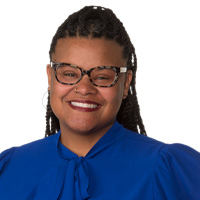
“After seeing the demand for Dr. DeSena-Jacobs’ class, we knew that developing a continuing education series was necessary to help further educate our community, which in turn helps the populations our participants serve,” says Stevara Haley Clark, Ed.D., M.S.W., interim associate dean for academic and student affairs. “We’ve had a tremendous turnout, with over 100 participants for each of our first two sessions.
“This further illustrates the need for us to continue providing this content to our community. In the spirit of our commitment, we strive to provide continuing education at a low cost, ensuring that this invaluable knowledge resonates far and wide, touching lives and fostering a community of compassionate care.”
Dr. DeSena-Jacobs is also presenting about the course development on April 10, 2024, at the Social Work Distance Education 2024 Virtual Conference, “Developing an Advanced Clinical Class through an Anti-Racist Lens.”
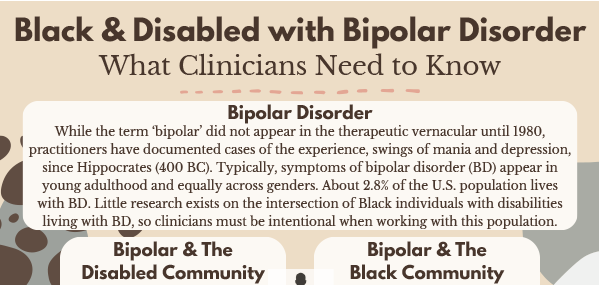
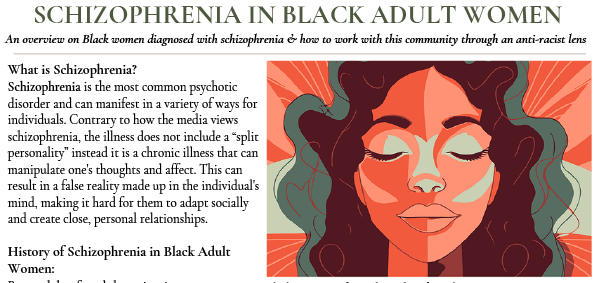
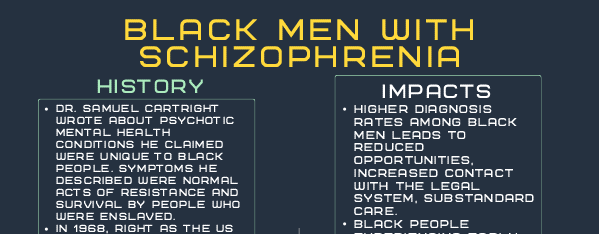
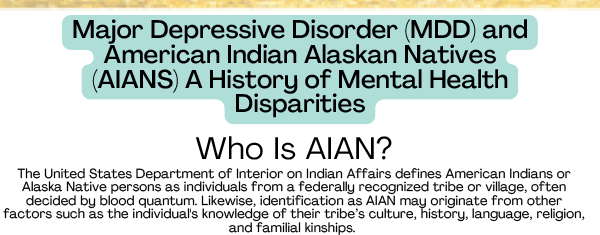
Excerpts of infographics that students created for the course on serious mental illness. » See each each graphic in full.
Blending anti-racist focus with traditional, nontraditional learning
Dr. DeSena-Jacobs’ course provides students with an in-depth analysis of the diagnoses that are considered “serious mental illness,” namely treatment-resistant depression, bipolar disorder and schizophrenia. They also learn about screening; treatment models; pharmacology; suicidality and crises; serious mental illness in children and adolescent populations; and the importance of collaboration.
“The other part that is important to highlight is that the entire class is taught through an anti-racist lens,” she says. “Students fill out their own anti-racist self-evaluation forms in Module 2 and repeat the forms in Module 9; the hope is that the material in the class will shift students’ perspectives on how to implement anti-racist material into their work with clients.”
Students also review the historical context of serious mental illness and populations impacted through an anti-racist lens, then create and share infographics.
The hope is that the material in the class will shift students’ perspectives on how to implement anti-racist material into their work with clients.
Cassie DeSena-Jacobs, D.S.W., LCSW
“The assignment helps students develop advanced knowledge about how specific populations diagnosed with SMI have experienced racism and oppression,” Dr. DeSena-Jacobs says. “It also provides an opportunity for students to think about oppression from an organizational perspective.
“I really appreciate that the class has anti-racism work woven into it and challenges students to ask themselves why it is often difficult to find anti-racist practices when working with clients that have serious mental illness. I have told students that if they cannot find answers to that question, they may be the generation that has to work with practitioners, researchers, community organizers, advocates and, most importantly, clients to develop them.”
Rather than using a traditional textbook, students read Robert Kolker’s “Hidden Valley Road: Inside the Mind of an American Family,” a New York Times No. 1 bestseller. As students learn about a family in the 1960s that had six children diagnosed with serious mental illness, they divide into treatment teams for discussion. Their final assignment is a case analysis and presentation of a trauma-focused treatment plan for a patient with a serious mental illness.
‘Incredibly empowering’ student experience
“Regardless of what career I end up in, the exposure to trauma-informed, anti-racist and collaborative care models will be utilized in my case conceptualizations as well as advocacy efforts,” says Emma Heinrich, an M.S.W. student who took the course last fall and will graduate this May. “Dr. DeSena-Jacobs treated all of us students as fellow practitioners, and the mutual respect witnessed throughout the course was incredibly empowering.”
As an instructor, Dr. DeSena-Jacobs draws on her own work history, using the perspective of time to rethink how she might have handled certain cases.
“I have worked in crisis work, hospital work and in private practice,” she says. “I am able to bring cases to this class, experiences I have had and situations where I handled things well – and situations where, looking back years later, I can see what I would do very differently. I think that sharing my experiences with students and having conversations around that is a very important part of social work classes. I take that very seriously.”
Categories Education, Faculty and staff, Students